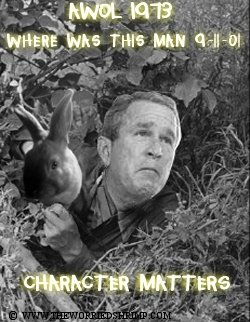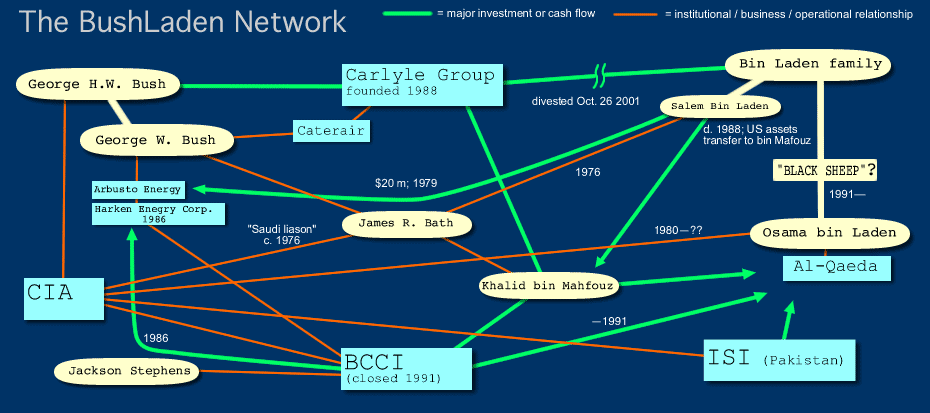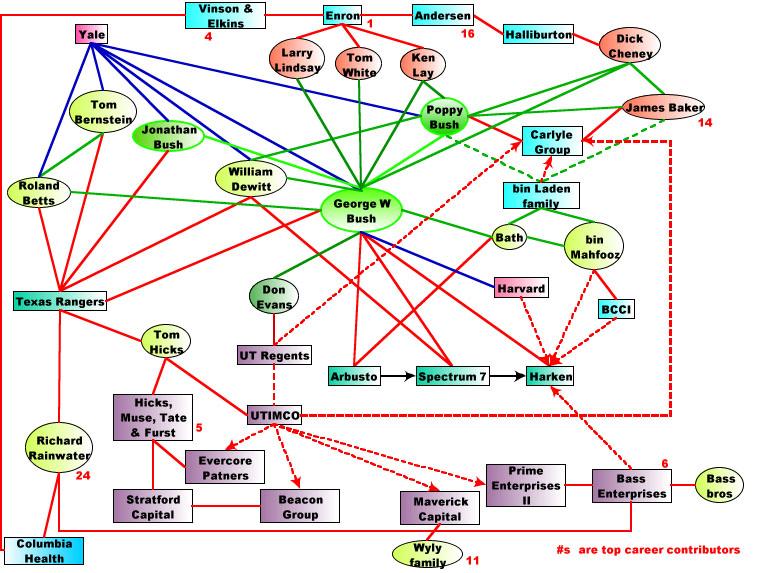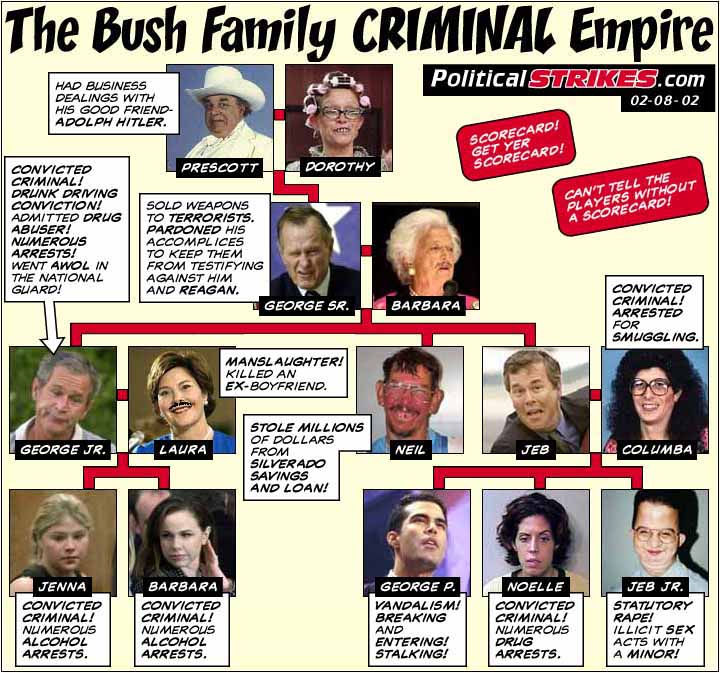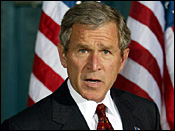
Information in President Bush's daily intelligence briefing last summer caused the administration to put all domestic agencies on alert.
May 16, 2002
 Information in President Bush's daily intelligence briefing last summer caused the administration to put all domestic agencies on alert. |
"We were trying to figure out what they (al Qaeda)
would do.
We never had specifics about time, place, MO (method of operation)."
U.S. intelligence official, commenting anonymously.
President Bush was told in the months before the Sept. 11 attacks that Osama bin Laden's terrorist network might hijack U.S. passenger planes - information which prompted the administration to issue an alert to federal agencies - but not the American public.
CBS News National Security Correspondent David Martin says the warning was in a document called the President's Daily Brief, which is considered to be the single most important document that the U.S. intelligence community turns out. The document did not, however, mention the possibility of planes being flown into buildings.
An agent in the FBI's Arizona office did, however, speculate about that, writing in his case notes about Zacarias Moussaoui that Moussaoui seemed like the type of person who was capable of flying an aircraft into the World Trade Center.
It was the observation of an agent taking notes as he thought about his case - an observation whose significance simply did not register at the time.
White House spokesman Ari Fleischer says that while President Bush was told last summer that bin Laden's al Qaeda network might hijack planes, he did not receive information suggesting that airplanes might be used as suicide bombs, as they were on Sept. 11.
Fleischer emphasizes that "until the attack took place, I think it's fair to say that no one envisioned that as a possibility."
The revelation about the president's security briefing comes as House and Senate Intelligence Committee investigators prepare for public hearings beginning next month on whether an intelligence community which spends $30 billion a year should have been able to provide a more specific warning in advance of Sept. 11.
The New York Times reports that an FBI agent in Arizona warned his superiors last summer that bin Laden might be sending students to U.S. flight schools.
Investigators have since Sept. 11 suspected bin Laden's al Qaeda network of masterminding the terror attacks on America, which killed more than 3,000 people.
"There's been a long-standing awareness in the intelligence community, shared with the president, about the potential for bin Laden to have hijackings," says Fleischer. "The information the president got dealt with hijackings in the traditional sense - not suicide bombers, not using planes as missiles."
According to Fleischer, after the information was presented to President Bush, the administration put domestic agencies on alert in the summer, just months before the Sept. 11 attacks.
That alert was not announced publicly but Fleischer suggests it may have prompted the hijackers to change their tactics.
"The administration, based on hijackings, notified the appropriate agencies and, I think, that's one of the reasons that you saw that the people who committed the 9-11 attacks used box cutters and plastic knives to get around America's system of protecting against hijackings," he said.
Fleischer does not say which agencies were put on alert and what they did in response.
In contrast , he says the Bush administration did go public last summer with a warning about terrorist threats on the Arabian peninsula.
Fleischer's comments followed the New York Times report that an agent at the FBI's Arizona office last July sent a memo to FBI headquarters warning that there were a large number of Arabs seeking pilot, security and airport operations training. The memo pointed to those statistics at one flight school and urged a check of all U.S. flight schools to identify any other students from the Middle East.
The memo also makes a passing reference to bin Laden, speculating that al Qaeda and other such groups could be behind a push for flight training. No evidence, however, was offered to back up that theory.
The FBI failed to make a connection between that warning and the August arrest of Zacarias Moussaoui - a French citizen of Moroccan descent detained in Minnesota after raising suspicions among his instructors at a flight school where he said he wanted to know how to fly, but not how to land or take off.
Moussaoui has emerged as the lone defendant charged in the aftermath of the attacks, which killed more than 3,000 people in New York, Washington and Pennsylvania. He is charged with conspiring with bin Laden and the 19 suicide hijackers to attack Americans.
FBI Director Robert Mueller has said repeatedly that he wishes the FBI had acted more aggressively in addressing the Arizona and Minnesota leads. Mueller has also said that nothing the FBI possessed before Sept. 11 pointed to the plot.
When hijacked airliners plowed into the World Trade Center, the Pentagon and a field in Pennsylvania, Middle Eastern men trained at U.S. flight schools were at the controls.
Earlier this month, Senate Intelligence Committee Chairman Bob Graham complained that the Justice Department and CIA had not provided congressional investigators with adequate access to documents and witnesses for a probe into intelligence failures related to the Sept. 11 attacks.
Graham said through a spokesman Wednesday that the revelations in the FBI memo mark an important discovery in Congress' investigation into why the FBI, CIA and other U.S. agencies failed to learn of and prevent the Sept. 11 plot.
"It represents a failure to connect the dots," says Graham spokesman Paul Anderson. "This was dismissed rather lightly at FBI headquarters."
On Feb. 6, in his first public comments after the Sept. 11 attacks, CIA Director George Tenet told a congressional hearing that the CIA had seen "spectacular threat reporting about massive casualties against the United States" in the spring and summer last year, but there was no specific information.
A U.S. intelligence official, speaking on condition of anonymity, says the CIA had continuously informed policymakers throughout the summer before Sept. 11 that bin Laden and his network might try to harm U.S. interests and discussed a range of possibilities that included hijackings.
"That was among the many things that we talked about all the time as a potential terrorist threat," says the intelligence official. "But when we talked about hijackings, we talked about that in the traditional sense of hijackings, not in the sense of somebody hijacking an aircraft and flying it into a building. We talked about concern about the general noise level about al Qaeda planning and we were trying to figure out what they would do. We never had specifics about time, place, MO (method of operation)."
May 16, 2002
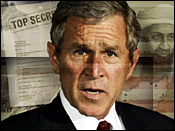 “How in the world could somebody have read this document and not had lights, firecrackers, rockets go off in their head that this is something that is really important?” Sen. Bob Graham (D-fl) |
"Members of Congress are raising questions as to whether the Bush administration should have reacted better to warnings in August that Osama bin Laden's followers might hijack a jet.
The White House revealed Wednesday night that President Bush was briefed on U.S. intelligence in August, while at his Crawford, Texas, ranch, that bin Laden's network might hijack U.S. passenger planes.
CBS News National Security Correspondent David Martin first disclosed the fact that the White House had received the bin Laden warning.
On Thursday, Bush spokesman Ari Fleischer said all possible action was taken given what was known.
"All appropriate action was taken based on the threat information that we had," Fleischer said. “The president did not - not - receive information about the use of airplanes as missiles by suicide bombers. This was a new type of attack that was not foreseen.”
Sen. Bob Graham, D-Fla., the Senate Intelligence Committee chairman, said the disclosures in the memos marked an important discovery in Congress' investigation into why the FBI, CIA and other U.S. agencies failed to learn of and prevent the Sept. 11 plot.
“How in the world could somebody have read this document and not had lights, firecrackers, rockets go off in their head that this is something that is really important?” Graham said of the Phoenix FBI memo.
After the information was presented to Mr. Bush, the administration put domestic agencies on alert in the summer, just months before the Sept. 11 attacks, Fleischer said. That alert was not announced publicly but Fleischer said it may have prompted the hijackers to change their tactics.
Members of Congress pointed to three pre-Sept. 11 warning signs : the U.S. intelligence Bush received, the fact that an FBI agent had written a memo urging FBI headquarters to investigate Middle Eastern men enrolled in American flight schools, and the arrest in Minnesota of Zacarias Moussaoui, who was believed to be training for a suicide hijacking.
Moussaoui has emerged as the lone defendant charged in the aftermath of the attacks, which killed more than 3,000 people in New York, Washington and Pennsylvania. He is charged with conspiring with bin Laden and the 19 suicide hijackers to attack Americans.
FBI Director Robert Mueller repeatedly has said he wished the FBI had acted more aggressively in addressing the Arizona and Minnesota leads but said nothing the FBI possessed before Sept. 11 pointed to the multiple-airliner hijacking plot.
The disclosure came amid questions about whether U.S. authorities failed to recognize and respond to warnings about possible terrorist attacks before the hijackings of the four passenger planes on Sept. 11.
“We've got terrorists connected to al Qaeda out in Arizona engaging in flight training, we've got Moussaoui arrested and being interrogated in Minnesota, we've got the president being briefed while he was on vacation in Texas about the possibility of these airplanes being hijacked. I mean, was anything done about any of those things?” said Sen. John Edwards, D-N.C.
Edwards called on the administration to help Congress investigate what happened, saying there has been some tension from the White House over starting a probe.
Mr. Bush made no immediate comment on the situation. He attended a National Hispanic Prayer Breakfast in Washington and said prayer has helped Americans of faith to get through the last eight months.
“The last eight months have showed the world the American character is incredibly strong and confident. Yet, prayer reminds us that a great people must be humble before God, searching for wisdom - constantly searching for wisdom from the Almighty,” he said.
May 17, 2002
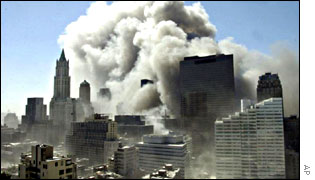
In the months leading up to 11 September US agencies and officials received a series of intelligence warnings and reports of suspicious activity.
December 2000
Intelligence agencies report "an increase in traffic concerning terrorist activities".
February 2001
Instructors at a flying school in Phoenix, Arizona express concern to Federal Aviation Administration (FAA) officials about the poor English and limited flying skills of one of their students, Hani Hanjour.
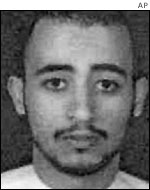 Hani Hanjour aroused suspicion at flying school |
They believe his pilot's licence may be fraudulent.
The FAA finds it is genuine - but school administrators tell Mr Hanjour he will not qualify for an advanced certificate.
Mr Hanjour allegedly flew a hijacked plane into the Pentagon on 11 September.
April - May 2001
Washington receives a "specific threat" about possible al-Qaeda attacks against US targets in the Middle East, the Arabian peninsular and Europe.
May 2001
State Department issues a statement on 11 May warning that "American citizens abroad may be the target of a terrorist threat from extremist groups with links to Osama Bin Laden's al-Qaeda organisation."
On 29 May, the department warns US citizens to "take appropriate steps to increase their security awareness to reduce their vulnerability".
June 2001
The FAA issues a warning to airlines of possible hijackings.
The State Department issues a worldwide caution and closes the US embassies in Senegal and Bahrain to the public to "review its security posture".
July 2001
An unnamed FBI agent in Phoenix, Arizona, issues a memo calling for an investigation into the large number of Middle Eastern men enrolled in pilot training programmes.
The agent warns that al-Qaeda could be attempting to place terrorists as pilots, security guards or aircraft maintenance workers.
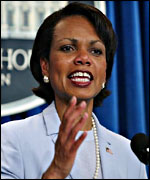 Condoleezza Rice has defended the government's handling of terror intelligence |
However, senior FBI officials pay little attention to the memo.
On 2 July the FBI issues a warning of potential threats overseas and adds that domestic attacks cannot be discounted.
President Bush asks National Security Adviser Condoleezza Rice to review and assess the apparent upsurge in threat warnings .
A counterterrorism group coordinated by the National Security Council meets due to heightened concern over possible attacks in Paris, Turkey and Rome.
The US goes on a heightened state of alert after an apparent threat to President Bush at the G8 summit in Genoa.
August 2001
As the third anniversary of the embassy bombings in Kenya and Tanzania passes, the FBI issues a further warning urging caution.
On 6 August, President Bush receives a report detailing Osama Bin Laden's alleged operating methods, including hijacking. The report is based on intelligence data from a 1998 British report according to officials.
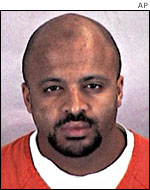 Zacharias Moussaoui : Allegedly trained by al-Qaeda |
On 13 August, the FBI arrests Zacharias Moussaoui, a French national who had raised suspicions among instructors at the Pan Am International Flight Academy in Minnesota.
Mr Moussaoui had reportedly paid $6,800 in cash and asked for training on large jets, despite his limited experience.
On 16 August the FAA warns that terrorists may have developed a range of modified mobile phones, key chains and pens for use as weapons.
French intelligence agencies later disclose that they believe Mr Moussaoui to be a radical Islamist, who has trained at al-Qaeda camps in Afghanistan.
He is later charged with being involved in the 11 September attacks.
In late August, the CIA issues an alert to the Immigration and Naturalisation Service over two men it is treating as suspects in the attack on the destroyer USS Cole in Yemen.
However it is later disclosed that one of the men - Khalid al-Midhar - had arrived in the US on 4 July.
The FBI are warned, but fail to track him down.
September 2001
On 7 September, the State Department warns of possible attacks on US military facilities or personnel in Japan and Korea.
An FBI agent who questioned Moussaoui reports a vaguely-defined terrorist plot targeting the World Trade Center to his superiors.
May 17, 2002
"Suicide bomber(s) belonging to al-Qaida's Martyrdom Battalion could crash-land an aircraft packed with
high explosives ... into the Pentagon, the headquarters of the CIA, or the White House."
1999 federal report
Two years before the Sept. 11 attacks, an analysis prepared for U.S. intelligence warned that Osama bin Laden's terrorists could hijack an airliner and fly it into government buildings like the Pentagon.
"Suicide bomber(s) belonging to al Qaeda's Martyrdom Battalion could crash-land an aircraft packed with high explosives (C-4 and semtex) into the Pentagon, the headquarters of the Central Intelligence Agency (CIA), or the White House," the September 1999 report said.
The Bush administration has asserted that no one in government had envisioned a suicide hijacking before it happened.
"Had I know that the enemy was going to use airplanes to kill on that fateful morning, I would have done everything in my power to protect the American people," Mr. Bush told U.S. Air Force Academy football team members who were visiting the White House on Friday. It was his first public comment on revelations this week that he was told Aug. 6 that bin Laden wanted to hijack planes.
CBS Senior White House Correspondent Bob Schieffer reports that other top officials were less forthcoming. The usually talkative Attorney General John Ashcroft just stared when reporters asked him about the terror warnings. FBI Chief Robert Mueller also refused to comment.
White House press secretary Ari Fleischer said the administration was aware of the 1999 report prepared by the Library of Congress for the National Intelligence Council, which advises the president and U.S. intelligence on emerging threats. He said the document did not contain direct intelligence pointing toward a specific plot but rather included assessments about how terrorists might strike.
"What it shows is that this information that was out there did not raise enough alarm with anybody," Fleischer acknowledged.
Former CIA Deputy Director John Gannon, who was chairman of the National Intelligence Council when the report was written, said officials long have known a suicide hijacking was a threat.
"If you ask anybody could terrorists convert a plane into a missile, nobody would have ruled that out," he said.
Democrats and some Republicans in Congress Friday raised the volume of their calls to investigate what the government knew before Sept. 11.
"I think we're going to learn a lot about what the government knew," Sen. Hillary Rodham Clinton said during an appearance in New York. She said she was unaware of the report created in 1999 during her husband's administration.
Sen. Charles Grassley, a senior member of the Senate Judiciary and Finance committees, demanded the CIA inspector general investigate the report, which he called "one of the most alarming indicators and warning signs of the terrorist plot of Sept. 11."
Meanwhile, court transcripts reviewed by The Associated Press show the government had other warning signs between 1999 and 2001 that bin Laden was sending members of his network to be trained as pilots and was considering airlines as a possible target.
The court records show the FBI has known since at least 1999 that Ihab Mohammed Ali, who was arrested in Florida and later named as an unindicted co-conspirator in the 1998 U.S. Embassy bombings in Africa, had been sent for pilot training in Oklhhoma before working as a pilot for bin Laden.
He eventually crashed a plane owned by bin Laden in Sudan that prosecutors alleged was used to transport al Qaeda members and weapons. Ali remains in custody in New York.
In February 2001, federal prosecutors told a court they gained information in September 2000 from an associate of Ali's, Morrocan citizen L'Houssaine Kherchtou, that Kherchtou was trained as an al Qaeda pilot in Kenya and attended a meeting in 1993 where an al Qaeda official was briefing Ali on Western air traffic control procedures.
"He (Kherchtou) observed an Egyptian person who was not a pilot debriefing a friend of his, Ihab Ali, about how air traffic control works and what people say over the air traffic control system," then-Assistant U.S. Attorney Patrick Fitzgerald told a New York court.
"And it was his belief that there might have been a plan to send a pilot to Saudi Arabia or someone familiar with that to monitor the air traffic communications so they could possibly attack an airplane perhaps belonging to an Egyptian president or something in Saudi Arabia."
That intelligence is in addition to information the FBI received in July 2001 from its Phoenix office that a large number of Arabs were training at U.S. flight schools and a briefing President Bush received in August of that year suggesting hijacking was one possible attack the al Qaeda might use against the United States.
The September 1999 report, entitled "Sociology and Psychology of Terrorism : Who Becomes a Terrorist and Why?" described suicide hijacking as one of several possible retribution attacks the al Qaeda might seek for a 1998 U.S. airstrike against bin Laden's camps in Afghanistan.
The report noted an al Qaeda-linked terrorist first arrested in the Philippines in 1995 and later convicted in the 1993 World Trade Center bombing had suggested such a mission.
"Ramzi Yousef had planned to do this against the CIA headquarters," the report said.
Bush administration officials have repeatedly said no one in government had imagined such an attack.
"I don't think anybody could have predicted that ... they would try to use an airplane as a missile, a hijacked airplane as a missile," National Security Adviser Condoleezza Rice said Thursday.
The report was written by the Federal Research Division, an arm of the Library of Congress that provides research for federal agencies.
"This information was out there, certainly to those who study the in-depth subject of terrorism and al-Qaeda," said Robert L. Worden, the agency's chief.
"We knew it was an insightful report," he said. "Then after Sept. 11 we said, 'My gosh, that was in there.'"
Gannon said the 1999 report was part of a broader effort by his council to identify the full range of attack options of U.S. enemies.
The vice president has repeatedly asked Congress not to investigate the intelligence failures. But with the new commotion, the White House now says it will cooperate with an investigation if it's done the right way.
May 8, 2002
One of the unanswered questions of September 11th is whether there was anything U.S. intelligence could have done to stop the attacks. New information suggests a key to the conspiracy could have been discovered before the attack - if it hadn’t been for what appears to be a communication breakdown between the FBI and French intelligence.
A month before September 11th, the FBI hauled in a French citizen, Zacarias Moussaoui. He’s now in jail-- the only person charged in the attacks. Prosecutors call him “the 20th hijacker.”
We now know that, back in August, Moussaoui’s possessions contained evidence that would expose key elements of the September 11th conspiracy. The FBI didn’t search Moussaoui’s things because it says it didn’t have enough evidence for a search warrant. Critical evidence was in the hands of French intelligence. The FBI says that if that evidence exists, the Bureau never received it .
If there was a golden opportunity to stop the attacks, Moussaoui was it. Prosecutors say he was following the same path as the other 19 hijackers. But there was a difference; Moussaoui couldn’t keep his mouth shut. That got him in trouble in August when he was taking flight simulator training at a school in Minnesota. He was a strange student with strange questions. He was interested in flight patterns around New York City. He asked whether the doors of a 747 could be opened in flight. And there was more.
He paid for his flight lessons, nearly $7,000, in cash and he told his instructors that he urgently needed to learn how to fly big jets, even though at the time he didn't have so much as the license to fly a Cessna. Within two days some of the instructors were openly talking about whether Moussaoui might be a hijacking suspect, so they decided to call the FBI.
That was August 15th and the next day, FBI and immigration agents staked out Moussaoui’s hotel. Sources familiar with the investigation tells us when Moussaoui stepped out, the agents asked him about his flight training and how he was paying for it.
Moussaoui told them that he always wanted to learn how to fly and he was a successful salesman. The FBI asked him what company he worked for and Moussaoui told the agents that he couldn't remember. It was all downhill from there. Moussaoui became belligerent - he told the agents that they wouldn't be harassing him if he wasn't an Arab. The agents asked to see his personal belongings and Moussaoui said no. The FBI didn't have any reason to arrest him at that point, but Moussaoui had overstayed the 90 days that he was supposed to be in the United States, so the immigration officer took him in.
They took him to the Sherburne County jail in Minnesota. The FBI was sure Moussaoui was up to something. They actually discussed whether he was plotting to crash a plane into a building in New York City. It was a hunch and a brilliant one. They wanted to search Moussaoui’s laptop and belongings. But they couldn’t without a warrant. So the agents asked FBI headquarters in Washington to try to get a special search warrant under a law called the Foreign Intelligence Surveillance Act — or FISA for short.
Until last year Eric Holder was deputy attorney general in the Justice Department. One of his responsibilities was reviewing hundreds of FISA applications. “Under FISA you have the ability, over a specified period of time, to not only do one search, but to do a number of searches, and then to take that from that person anything that's of foreign intelligence value,” he says.
To get the search warrant, the FBI needed evidence to link Moussaoui to a specific terrorist group. A computer search at the National Security Agency and at the FBI, and CIA found nothing. Moussaoui is a French citizen of Moroccan descent, so the FBI asked French intelligence what they had.
The French had reason to link Moussaoui to Osama bin Laden’s organization. 60 Minutes talked with several sources in French intelligence and they all agree on three points. First, back as early as 1995 French agents traced Moussaoui to Afghanistan on what they believe was a trip to an Al Qaeda camp. Second, in 1999, the French put Moussaoui on a watch list of potential terror suspects. Third, in 2000 , French intelligence followed Moussaoui to Pakistan. They believe he went to see a man named Abu Jaffa—a top lieutenant to Osama bin Laden.
Jean-Louis Bruguiere is a French judge and one of the world’s top terror investigators. The law prevents him from talking about classified intelligence related to Moussaoui, but he did tell 60 Minutes that French agents were closely watching French citizens in Afghanistan.
“We know that people were training in Afghanistan to come back in Europe and be able to set up, organize and run terrorist networks,” he says.
Was Moussaoui placed on a watch list of terrorist suspects in 1999? “If by a watch list you mean everyone who could be of interest to the security services, well then probably Mr. Moussaoui is on that list,” Bruguiere says.
Bruguiere is famous for being a step ahead of most other terror investigators—including one case similar to the Moussaoui investigation. In 1999 Bruguiere wanted to question Al Qaeda’s Ahmed Ressam, who was living in Canada. The Canadians refused and Ressam was next seen in Washington state with a trunk load of explosives meant to bomb the Los Angeles airport. Ressam was convicted last year. Bruguiere says that when the FBI asked about Moussaoui, French intelligence was eager to help.
“For this particular case, I can’t discuss the specific details. But overall all the information we had, we handed it over,” he says.
“We gave them everything we had,” says Bruguiere. “Or what we knew when these requests were made.”
The French had been following Moussaoui for years. In the 1990’s they tracked him to London where he learned militant Islam from radical clerics including Abu Qatada. French intelligence has linked Qatada to Osama bin Laden. Qatada preaches a particularly violent brand of Islam and encourages Muslims to take up jihad wherever they can. So Moussaoui took that advice and went to Chechnya to join Muslims in their fight against Russian troops. French intelligence was aware of that move and his later trip to Afghanistan.
The French had a thick file on Moussaoui. But U.S. government sources tell us the FBI never received all the information from the French. These sources say the French sent only a few pages to FBI headquarters that described Moussaoui as an Islamic extremist and dangerous—but never mentioned what the French believed about the bin Laden connections in Afghanistan and Pakistan.
Three months after the attacks, FBI director Robert Mueller said this about the effort to get the search warrant. “All I can tell you is that the agents on the scene attempted to follow up aggressively. The attorneys back at FBI determined that there was insufficient probable cause for a FISA, which appears to be an accurate decision. And September 11th happened.”
The FBI has characterized the quality of French information after the arrest of Moussaoui in August, as vague and sketchy - in other words, not very good.
“We don’t only give general information,” says Bruguiere. “We have detailed information, we give as much detail as we know. If the FBI thinks that the information is valuable, that’s its own responsibility.”
Judge Bruguiere refuses to criticize the FBI but he is adamant that in the weeks before September 11th, French intelligence shared its wealth of information on Moussaoui.
“French authorities have always given all their partners, including the United States, all information they had and I am sure that in this case, as in others, we didn’t hide any information,” he says.
It’s not possible to reconcile what the French say they sent and what the FBI says it received; neither the French nor the FBI will let 60 Minutes see those communications, and the FBI has declined an interview. We do know that by the end of August, after a series of meetings at headquarters, FBI lawyers decided they would not even try to get a warrant to search Moussaoui’s things.
At the Minnesota jail, the FBI’s field agents felt their backs were against a wall—headquarters told them they couldn’t search Moussaoui’s possessions and time was running out before he would be deported—so they tried something desperate.
They decided to try to bluff Moussaoui into a confession. Federal sources familiar with this investigation tell us that FBI agents came here for a final confrontation. They told Moussaoui that they knew he was a terrorist, knew he was a hijacker and they weren’t going to let him leave the country . The FBI agents warned Moussaoui that he was in serious trouble, but he could still help himself if would just told the FBI everything he knew.
But if Moussaoui couldn’t keep his mouth shut before—he was certainly doing it now. He did say if the agents just would let him go, he’d finish his flight training and head back to France. His deportation was scheduled for September 17th. The FBI planned to put him on a commercial flight with three armed agents. In Paris, Moussaoui and his still untouched possessions would be turned over to Judge Bruguiere. But, of course, that never happened.
After September 11th the FBI got a search warrant that its field agents had wanted for three weeks, and they immediately found the evidence that led to key conspirators in the attacks. According to Moussaoui’s indictment, the FBI found his notebook, listing a German phone number. That number traced back to Ramzi bin al Shibh. Bin al Shibh was the roommate of Mohammad Atta, the leader of the attacks. Bin al Shibh and Atta created a German Al Qaeda cell together. Bin al Shibh wired tens of thousands of dollars to Moussaoui and another hijacker, Marwan al-Shehhi, who flew into the World Trade Center’s South tower.
“It's a good lead,” says Holder. “We certainly know more about al-Shibh now than we did then. I don't know exactly what we knew about him, you know, prior to September 11th, but clearly the connection to him, the German connection, knowing now what we know about Atta and his German connections, all of these things would have been important.
Of course, that’s hindsight. In the days before September 11th no one could have anticipated the horror that was about to unfold. What we know now is that the German phone number is the key to the government’s case connecting Moussaoui to the September 11th conspiracy. We’ll never know what might have happened if the FBI had been able to make that connection in the days before September 11th.
November 7, 2001
US special agents were told to back off the bin Laden family and the Saudi royals soon after George Bush became president, although that has all changed since September 11, it was reported today.
And the BBC2's Newsnight program also said the younger George Bush made his first million 20 years ago with an oil company partly funded by the chief US representative of Salem bin Laden, Osama's brother, who took over as head of the family after his father Mohammed's death in a plane crash in 1968.
The program said it had secret documents from the FBI investigation into the terror attacks on New York and Washington which showed that despite the myth that Osama is the black sheep of the family, at least two other American-based members of it are suspected of links with a possible terrorist organisation.
The program said it had obtained evidence that the FBI was on the trail of bin Laden family members living in the US after, and even before, September 11.
A document showed that special agents from the Washington field office were investigating Abdullah, a close relative of Osama, because of his relationship with the World Assembly of Muslim Youth (WAMY), a suspected terrorist organisation, it said.
The program said it had found where he used to live with another close relative, Omar, also an FBI suspect, in Falls Church, Virginia, a suburb of Washington. The house was conveniently close to WAMY, it said, and just a couple of blocks down the road was a place listed by four of the alleged hijackers as their address.
The US Treasury has not frozen WAMY's assets, and insists it is a charity, the program said, yet Pakistan had expelled WAMY "operatives" and India claimed WAMY was funding an organisation linked to bombings in Kashmir.
The FBI did look into WAMY, but for some reason agents were pulled off the trail, it said.
The program has uncovered a long history of shadowy connections between the State Department, the CIA and the Saudis, it said.
The former head of the American visa bureau in Jeddah from 1987 to 1989, Michael Springman, told the program: "In Saudi Arabia I was repeatedly ordered by high-level State Department officials to issue visas to unqualified applicants.
"People who had no ties either to Saudi Arabia or to their own country. I complained there. I complained here in Washington to Main State, to the inspector-general and to Diplomatic Security and I was ignored."
He added : "What I was doing was giving visas to terrorists - recruited by the CIA and Osama bin Laden to come back to the United States for training to be used in the war in Afghanistan against the then Soviets."
The US wanted to keep the pro-American Saudi royal family in control of the world's biggest oil spigot, even at the price of turning a blind eye to any terrorist connection - so long as America was safe, the program said.
The program said the younger George Bush made his first million 20 years ago with an oil company partly funded by the chief US representative of Salem bin Laden, Osama's brother, who took over as head of the family after his father Mohammed's death in a plane crash in 1968.
Young George also received fees as director of a subsidiary of Carlyle Corporation, a little-known private company which in just a few years of its founding has become one of America's biggest defence contractors, and his father, Bush Senior, is also a paid adviser, the program said.
And it became embarrassing when it was revealed that the bin Ladens held a stake in Carlyle, sold just after September 11, it added.
The program said it had been told by a highly-placed source in a US intelligence agency that there had always been "constraints" on investigating Saudis, but under President Bush it had become much worse.
After the elections, the intelligence agencies were told to "back off" from investigating the bin Laden family and the Saudi royals, and that angered field agents, the program added.
The policy was reversed after September 11, it reported.
The program was told by FBI headquarters that it could not comment on its findings.
A spokesman reportedly said: "There are lots of things that only the intelligence community knows and that no one else ought to know."
PA
 "Clinton's advisors met nearly weekly on how to stop bin Laden ... "I don't believe any longer that it's a matter of connecting the dots. "Of course Bush knew about the impending attacks on America .
He did nothing to warn the American people, because he needed this war on terrorism. His daddy had Saddam and he needed Osama. His presidency
was going nowhere. He wasn't elected by the American people, but placed in the Oval Office by the conservative Supreme Court; the economy was
sliding into the usual Republican pits and he needed something to hang his presidency on. This guy is a joke. His silence was sleazy and contemptible."
 "It looks like congress has finished investigating the 9-11 attacks and doesn't it figure?
They spent three weeks and two million dollars investigating the 3000 WTC murders ... but they spent three YEARS and $200 million chasing after
Clinton's zipper!" "A nation that maintains a 72% approval rating on George W. Bush is a nation with a very loose grip on
reality." "After pulling together the information in the 9/11 Report, it is understandable why Bush is stonewalling. It is not
very difficult to deduce what the president knew, and when he knew it. And the portrait that results is devastating."

"The most important thing is for us to find Osama bin Laden. It is our number one priority and we will not rest until we find
him." "I don't know
where he is.
I have no idea and I really don't care. It's not that important. It's not our priority." |

